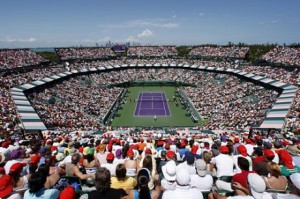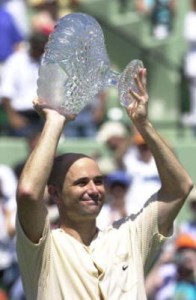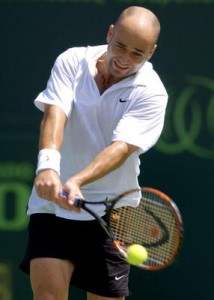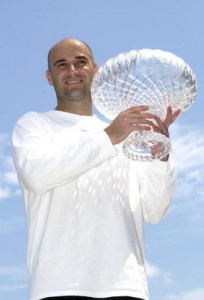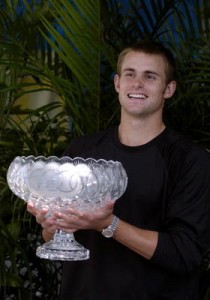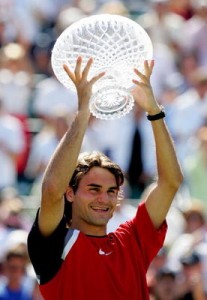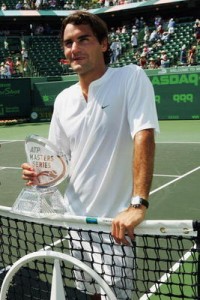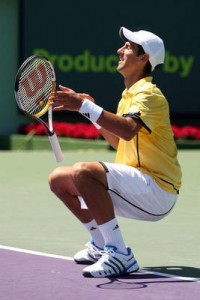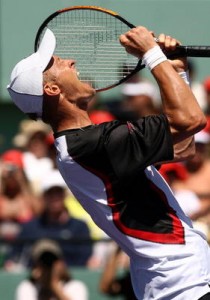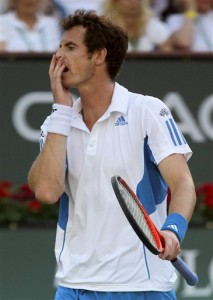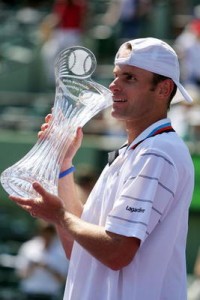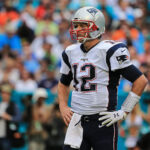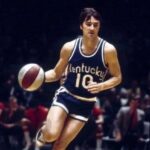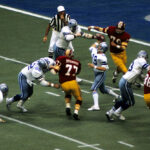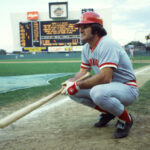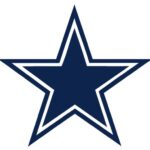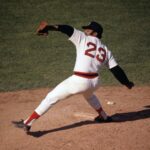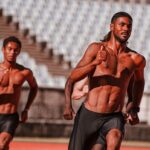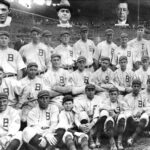High Notes for the Past Ten Champions at the Sony Ericsson Open in Miami
The blueprint for the Sony Ericsson Open existed long before the tournament materialized as part of the tennis landscape in the United States––more specifically in Miami.
The man who pursued the dream and saw it through to its often-complicated conclusion was Butch Buchholtz, a former tennis pro who toured with such notables as Pancho Gonzalez and Jack Kramer back in the 1960s.
On February 4, 1985 after years of negotiations with the ATP and WTA, the first ball was served in a combined tennis event called the International Players Championships sponsored by Lipton.
Tim Mayotte and Martina Navratilova were its first two winners. In fact the final featured Chris Evert and Navratilova and the stands were jam-packed.
The inaugural tournament was held at Delray Beach.
After relocating a few times, the tournament finally settled in the newly constructed Tennis Center at Crandon Park in Miami-Dade Country in 1989. In 1994 came the addition of a $20 million permanent stadium.
Andre Agassi holds the record for the men having won this title six times in his career. The next closest male is Pete Sampras who won this title three times. Ivan Lendl won the title twice.
Current players Andy Roddick and Roger Federer have also won this title twice.
Current top seed and top-ranked Rafael Nadal has never won the title at the Sony Ericsson Open. Perhaps this year?
2001: Andre Agassi Defeated Jan-Michael Gambill 7-6, 6-1, 6-0
Redemption Song
American Andre Agassi was living proof that men and careers can rise from the ashes.
Declared practically dead by the press and most fans, Agassi, in winning the Ericsson Open on Sunday, left Miami with his third title of the year.
This as the American readied himself to celebrate birthday No. 31.
Seeded No. 3 American Andre Agassi won his fourth title in Miami, his last coming in 1996. On his path to the final, Agassi defeated American Taylor Dent 6-4, 6-2 in the second round, and German David Prinosil 6-1, 6-3 in the third round,
Agassi followed that with a walkover in the fourth round when German Tommy Haas withdrew before the scheduled match.
In the quarterfinals Agassi dispatched Croat Ivan Ljubicic 6-4, 6-4 and in the semifinals the American fought hard to overcome Aussie Patrick Rafter 6-0, 7-6, 6-2.
Agassi arrived at the final where he faced fellow American Jan-Michael Gambill. Gambill threw everything but the proverbial kitchen sink at Agassi in the first set.
The No. 3 seed, however, outlasted the younger American, taking the tie-break. After that opening set, Gambill had no more to give and Agassi eased out of the match.
The win gave Agassi Masters Shield No. 12.
Leading up to the Ericsson Open, Agassi had defended his Australian Open championship then won back to back Masters Series titles at Indian Wells and in Miami.
Agassi was just getting started, again.
2002: Andre Agassi Defeated Roger Federer 6-3, 6-3, 3-6, 6-4
Papa Was a Rolling Stone
In 2002 the No. 9 seed Andre Agassi won his second consecutive title at the NASDAQ-100 in Miami–his fifth title overall at this event.
The American’s opponent in the final was Swiss Roger Federer who had made a name for himself in 2001 by upsetting Pete Sampras at Wimbledon.
Agassi advanced to the finals by defeating Brit Greg Rusedski 6-3, 6-1 in the second round followed by a win over Argentine Agustin Calleri 6-3, 6-2 in the third round.
Agassi met and defeated Thomas Johansson, the No. 8 seed, in the fourth round 7-5, 6-2.
The American’s quarterfinal opponent was Nicolas Lapentti. Agassi dispatched the man from Ecuador 6-3, 7-5. Agassi met and defeated Marcelo Rios in the semifinals 6-7, 6-4 when Rios retired.
Federer advanced to his very first Masters Series final. The Swiss seemed overwhelmed by the occasion in the first two sets of the match, facing perennial champion Agassi.
Coming into this match, Federer had not lost a set or his serve. But Agassi, with his relentless pressure and aggressive tactics, quickly set Federer back on his heels.
Agassi fell behind 0-2 in the opener but then broke Federer three times successively ripping return winners past the Swiss who often stood flat-footed watching them sail past.
By the time Federer awoke, he was down two sets.
Settling into the match, the Swiss won the third set and was up a break in the fourth when Agassi found another gear and managed to level the set at 4-4.
Winning eight of the final ten points, Agassi celebrated another win on the courts in Miami.
Wins over the man from Switzerland, however, would be few after this encounter.
2003: Andre Agassi Defeated Carlos Moya 6-3, 6-3
From a Miami Six
The No. Two seed Andre Agassi won his sixth title at the 2003 NASDAQ-100 Tournament in Miami which left him standing head and shoulders above all other competitors throughout this tournament’s history.
The next closest player is Pete Sampras with three titles.
In fact, Agassi won this title consecutively from 2001-2003, another record unequaled by any other player in the tournament’s history.
In 2003 Agassi defeated fellow American Michael Chang 6-4, 6-2 in the second round and Jarkko Nieminen 6-2, 6-0 in the third round. In the fourth round Agassi defeated Australian Mark Philippoussis 4-6, 6-3, 6-2.
Moroccan Younes El Aynaoui took a set but fell to Agassi in the quarterfinals 7-6, 4-6, 6-1. Agassi met Albert Costa in the semifinals defeating the Spaniard 6-2, 6-4.
Agassi faced the No. 5 seed Carlos Moya in the final. The American was relentless in shutting down Moya by applying continuous pressure.
He broke the Spaniard during his second service game and then held on to serve out the first set.
In the second set Moya held on until 3-3 when Agassi once again stepped up the pressure and broke the Spaniard’s serve going up 4-3. Once again, Agassi hung on to win the set and the match in 71 minutes.
In winning his sixth NASDAQ-100 championship, Agassi passed his wife, Steffi Graf who won this same event five times on the women’s side.
Agassi was thrilled he said to be able to surpass Graf at something.
2004: Andy Roddick Defeated Guillermo Coria 6-7, 6-3, 6-1 (Retire)
Born in the U.S.A
Both players in the final of the NASDAQ-100 on Sunday in April of 2004, were under the weather. Andy Roddick suffered from an upset stomach while Guillermo Coria wrenched his back–an injury the Argentine suffered in the first set.
Nonetheless, seeded No. Two, Roddick won his first championship at the NASDAQ-100 in Miami. The American made his way through the field in workman like fashion.
In the second round Roddick met and defeated Slovakian Karol Beck, followed by a victory over Swede Jonas Bjorkman 6-4, 3-6, 6-3 in the third round.
In the fourth round the American defeated Guillermo Canas 6-3, 6-3. Roddick took out Carlos Moya in the quarterfinals 5-7, 6-2, 7-5 followed by a victory over fellow American Vince Spadea 6-1, 6-3 in the semifinals.
Seeded No. Three Argentine Coria made his way into the final defeating Nicolas Kiefer 6-3, 6-3 in the quarterfinals and Fernando Gonzalez 4-6, 7-6, 6-1 in the semifinals.
It promised to be a sparkling final with the No. Two and No. Three seeds both playing very well.
Coria managed to win the first set tiebreak after receiving treatment on his back. The Argentine, however, could not compete at full strength after that because his back hurt too much to allow Coria to extend fully on his serve.
Coria finally retired in the first game of the fourth set, realizing he could not continue.
Roddick who had lost his No. One ranking to Roger Federer was very happy to secure this win and compile a 26-5 record so far in 2005.
It allowed Roddick to climb back up to the No. Two spot directly behind the Swiss.
2005: Roger Federer Defeated Rafael Nadal 2-6, 6-7, 7-6, 6-3, 6-1
Battle of Evermore
Designate this one as a classic––a true golden oldie.
The tournament in 2005 was all about the final match which featured World No. One Roger Federer and up-and-coming Majorcan Rafael Nadal seeded No. 29 at the NASDAQ-100 Open.
Federer had defeated Tim Henman in the quarterfinals and Andre Agassi in the semifinals to reach his second final in Miami.
This was not the first time he had faced Nadal on these courts. The two had met in 2004 when the teenager upset new World No. One Federer in the third round 6-3, 6-3.
A year later in 2005, the Swiss was riding another dominating year as No. One. But Nadal, playing extraordinary tennis, took the first two sets.
To win, however, Nadal had to seize three sets because in 2005 the ATP still concluded its Masters Events finals with a best-of-five format.
Scrambling, Federer regrouped in time to win the third-set tiebreaker. Then the Swiss dominated in the last two sets, allowing Nadal only four games.
Even though Nadal lost, many considered it a break-through performance.
The World No. One defeated Rafael Nadal of Spain 2-6, 6-7, 7-6 , 6-3, 6-1 to keep his winning streak alive but admitted after the match that he had been lucky.
Federer extended his overall 2005 winning streak to 22 matches and his record victory streak in ATP finals to 18.
It was the fifth title that year for Federer, and his second straight ATP Masters Series title, having defended his Pacific Life Open title at Indian Wells two weeks ago.
2006: Roger Federer Defeated Ivan Ljubicic 7-6, 7-6, 7-6
Anything You Can Do I Can Do Better
In 2006 the NASDAQ-100 Open was still a best of five format.
Federer was the No. One seed coming into Miami and the defending champion, having won this event in 2005.
In order to reach the final, the Swiss had to overcome Frenchman Arnaud Clement 6-2, 6-7, 6-0 in the second round, followed by a win over the No. 27 seed Tommy Haas 6-1, 6-3 in the third.
Federer followed these opening round wins by defeating Dmitry Tursunov 6-3, 6-3 in the fourth round, the No. Nine seed James Blake 7-6, 6-4 in the quarterfinals and the No. 11 seed David Ferrer 6-1, 6-4 in the semifinals.
In the final the Swiss met the big-serving Croat Ivan Ljubicic in three gut-wrenching tie-breaks with Federer finding himself trailing in each one.
Federer, however, managed to hang on and play the big points better when the opportunities arose, winning a very tight match.
The Swiss won Indian Wells and Miami back to back. and his overall record in 2006 rose to 28-1 after this match.
Having won his last eight in a row, Federer was now 9-2 in career Masters Series finals.
The Swiss had participated in 11 consecutive tournament finals, which drew him within one of tying John McEnroe’s 1984 mark of 12 in a row.
By the conclusion of this tournament in 2006, Federer had won 24 straight Masters Series matches, plus the Swiss had won four straight Masters Series events––a record since the inception of the series in 1990.
It was a very good year for the Swiss Maestro.
2007: Novak Djokovic Defeated Guillermo Canas 6-3, 6-2, 6-4
Forever Young
Teenager Novak Djokovic became the youngest player ever to win the Sony Ericsson Open.
Seeded No. 10, the Serb met and defeated Italian Daniele Bracciali 7-6, 6-4, Michael Llodra 6-4, 6-1, Feliciano Lopez 6-0, 6-3, the No. 2 seed Rafael Nadal 6-3, 6-4, and the No. 12 seed Andy Murray who retired at 5-3 during the first set.
The man Djokovic met in the final, qualifier Guillermo Canas, was the very same player who shocked the tennis world by ousting the No. One seed Roger Federer.
Canas not only sent Federer packing early in Miami, he had done the same thing to the Swiss two weeks before at Indian Wells.
This was not the outcome Federer expected. To say the World No. One was not pleased to be dismissed so rudely by a qualifier is quite the understatement.
For Djokovic, the win marked his first ATP Masters Shield.
The teenager saved all the break points he faced in the match. In fact Djokovic was only broken once during the entire tournament.
Djokovic won this title without dropping a set.
2008: Nikolay Davydenko defeated Rafael Nadal 6-4, 6-2
The Magical Mystery Tour Racket
In 2008 Russian Nikolay Davydenko was under scrutiny by the ATP for some illegal wagering on a tennis match in Poland that the organizing body sensed smelled funny.
The year had thus far been unbearable for the slight-framed Russian who complained about the length of time the ATP spent investigating––leaving Davydenko lingering far too long in an unflattering spotlight.
Prior to the tournament, Davydenko had switched racket models and used the one new racket he possessed for all five matches he played including practice and warm-ups.
It became the Russian’s tennis equivalent of Excalibur.
Davydenko filleted competitors, one after another, seeming unstoppable during the two-week stint in Miami.
As the No. 4 seed entering Miami, Davydenko met and defeated Ernests Gulbis 3-6, 7-6, 7-6, Simone Bolelli 6-7, 7-5, 6-1, Mario Ancic 4-6, 6-3, 7-5, Janko Tipsarevic 6-2, 6-1, and Andy Roddick 7-6, 6-2.
That propelled the Russian into the final where he defeated Rafael Nadal 6-4, 6-2.
After playing on somewhat even terms for the first six games, Davydenko broke Nadal at love to go up 4-3. The Russian did not look back after that.
Nadal could do nothing against the Russian’s serve. The Majorcan fought hard but to no avail. Davydenko was not going to be denied as he became the first Russian player to win in Miami.
The Russian hit serves of up to 132 mph and won five of his own service games at love. Davydenko won 17 points at the net, hitting 19 winners against 12 unforced errors.
After fighting off match points twice before reaching the final, Davydenko rolled through his final two top-ten ranked opponents.
After winning Davydenko laughed, stating to all the world that he would keep this racket forever.
Footnote: eventually the ATP investigation ended with no wrongdoing by Davydenko uncovered .
2009: Andy Murray Defeated Novak Djokovic 6-2, 7-5
We’re Having a Heat Wave
Andy Murray captured the Sony Ericsson Open in 2009––marking his third Masters Series win. The No. Four seed also became the first Brit to win the title in Miami.
His opponent in the final was Serb Novak Djokovic.
The win inched Murray to within 170 points of the No. Three ranked Djokovic who was looking for his second win in Miami. The Scot, however, was not to be denied––capturing his first Sony Ericsson title.
Murray made his way through the draw by defeating Juan Monaco 4-6, 6-3, 6-2 in the second round, Nicolas Massu 6-4, 6-4 in the third, and Serb Victor Troicki 6-1, 6-0 in the fourth round.
Murray went on to defeat No. Eight seed Fernando Verdasco 6-1, 6-2 in the quarterfinals, and the No. Six seed Juan Martin del Potro 6-1, 5-7, 6-2 in the semifinals.
In the meantime Djokovic had his hands full getting past the No. Two seed Roger Federer in the semifinals 3-6, 6-2, 6-3.
In the match against Djokovic, Murray got off to a fast start, breaking the Serb’s serve in the opening game. Early in the set, Murray led 4-0.
Djokovic’s play was plagued by unforced errors compounded by an uncertain attack. Murray took the first set 6-2.
Murray began the second set in similar fashion, breaking the Djokovic serve. Admittedly Djokovic suffered in the afternoon heat.
Unlike the first set, however, Murray faltered and Djokovic broke back to level the match at 1-1. Murray’s level of play fell off considerably after his serve was broken.
The Scot fell behind 1-4 before finally holding on to win his second game taking the score to 2-4.
As Djokovic served to win the set and level the match, Murray woke up and began to apply pressure through aggressive play again, finally evening the score at 5-5.
Murray won the second set and the match shortly thereafter at 7-5.
2010: Andy Roddick defeated Tomas Berdych 7-5, 6-4
Back in Time
No. 6 seed Andy Roddick rolled again through the competition capturing the Sony Ericsson Open for the second time––his first since 2004.
His opponent, No. 16 seed Tomas Berdych, also enjoyed the thrill of overcoming some top-notch competition on his way to the final, including a win over the No. One seed Roger Federer.
On his way to the final Roddick defeated Igor Andreev 6-4, 6-4, Sergiy Stakhovsky 6-2, 6-1, Benjamin Becker 7-6, 6-3, Nicolas Almagro 6-3, 6-3, and the No. 4 seed Rafael Nadal 4-6, 6-3, 6-3.
Roddick, who was beaten in the finals at Indian Wells two weeks prior to this final, would not be denied in Miami, capturing another Masters Shield––his last one coming in Cincinnati in 2006.
The two competitors played a very tight match with neither facing a break point in the first set until the score stood at 5-5. Berdych stumbled at this point, giving Roddick the break.
The score stood at 6-5, giving Roddick a golden opportunity to capture the first set. The American did just that––serving it out at love, ending the set with a fifth ace.
In the second set, Roddick secured an early break and went on to win the set and the match.
Even though Berdych lost the match, the Czech’s confidence soared after this tournament and he went on to have a stellar year as his ranking rose into the top ten.
The Sony Ericsson Open was the final jewel in the crown for an outstanding early hard court season for American Andy Roddick.
The American, however, would quickly pull out his invisibility cloak for the 2010 clay court season failing to capitalize on his early season impetus.
It was a great win for the Scot as he hoped to advance on the rankings during the remainder of 2009.
The win was a product of the Serb’s brilliant shot-making compounded by the wear and tear endured by the Argentine who had played two qualifying matches plus six main draw matches. Additionally, early on in the first set, Canas tweaked his left hamstring.
This was the start of a very good year and a brilliant career for the young Serb Novak Djokovic.
